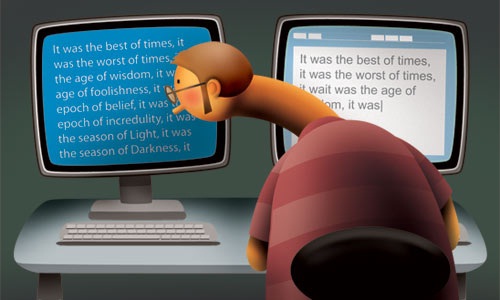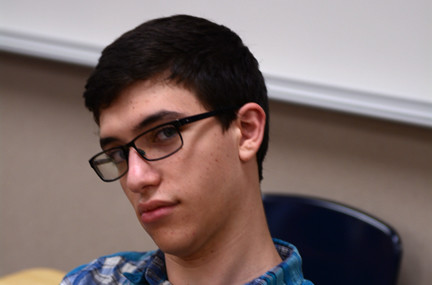Plagiarism: The Age of Technology Has Become Too Tempting

courtesy of plagiarismchecker.net
October 29, 2014
How would you feel if someone reached into your backpack right now and took your math homework. What if they turned in the math homework that YOU did? What would you think of that person? They didn’t do the work. They just stole yours. And to top it all off… they didn’t say thank you or even acknowledge that you did all the work. Plagiarism is the exact same thing. Mr. Cadra profoundly stated, “Plagiarism is unethical no matter the degree in which it is being committed. Unfortunately, the digital age we live in has made plagiarism far too easy for the lesser individuals who choose that route.” When you go onto Wikipedia and copy and paste into your essay without citing the source, that, my friends, is plagiarism. When you look up a quote and neglect to say who said it, that’s plagiarism. Already this year, several students have been caught plagiarizing. And those are only the students who have been caught! Think of all of those who haven’t. Ms. Ferris explained “as a teacher, plagiarism is a pain…I have much more respect and sympathy for someone who fesses up to not doing his/her homework instead of someone who attempts to copy it quickly before class in a last ditch effort to get the 5-10 points.”
In a time where information is so readily available, a problem occurs where students find it too tempting to Google an answer instead of looking it up in their notes or in a text book. This is generally okay, but the real issue is students using that information in an essay and then not citing their sources! It is too easy with the internet. Sites like easybib.com practically do all the work for you! Yet in an act that can only be described as lazy, young writers will not take the two minutes to add an extra source to their “Works Cited” page. And the consequences are not small for this act of dishonesty.
For those who are not familiar, Yorba Linda High School’s policy on plagiarism and on cheating in general is as follows:
Incident 1: Zero on assignments; parent contact; referral to counselor
Incident 2: Zero on assignment; parent contact; placed on contract; Saturday School
Incident 3: Drop from class with a “WF”
And if you think these penalties go away in college, they don’t. Fullerton college, for example, has a similar policy to our own:
“a student is responsible for academic dishonesty, shall:
1. Assign an appropriate academic penalty, including, but not limited to: oral reprimand; “F” or “O” on the assignment; grade reduction on assignment or course; or “F” in the course. Factors to take into consideration in assigning a grade sanction include: normative sanctions for comparable acts, severity of the offense (academic gain or potential academic gain if the action had gone undetected), harm or potential harm to other students in the class, premeditation of the act.
2. Report to the student(s) involved, to the department chair, and to the Dean of Students Office, Judicial Affairs, the alleged incident of academic dishonesty, including relevant documentation, actions taken by the instructor including grade sanction, and recommendations for additional action that he/she deems appropriate. The written report should be distributed as soon as possible, preferably within 15 calendar days from discovery, but not later than 30 calendar days after the first day of classes of the regular semester (fall or spring) following the grade assignment.”
Although that little sentence from Sparknotes doesn’t seem like a lot now, just keep in mind that it could have a much greater effect than you think.




































